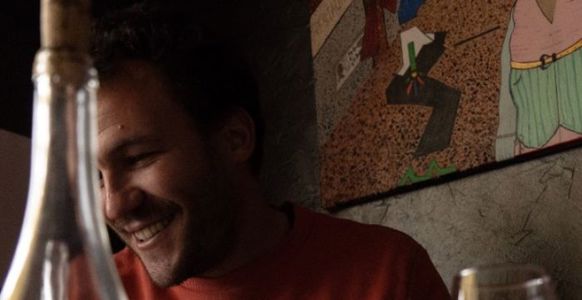Domaine Carterole

Domaine Carterole Gallery
Thank you to importer Louis/Dressner for this estate profile.
Joachim Roque is a native of Collioure, the famed medieval town on the Mediterranean coast of French Catalunya. While tourism now reigns as its principle economy, for generations Collioure was a fisherman’s village. To supplement their income, keep busy in the off-season and have wine for personal consumption, all fishermen had vines. Joachim’s grandfather was the last major fisherman of the village, and from a young age his grandson would help out on weekends during the harvest. After a failed first year of university, Roque decided to stop school and start working; athletic and a fan of the outdoors, working in the vines seemed like a good fit.
In Collioure and Banyuls, the cave cooperatives have a quasi-monopole of locally grown grapes. Almost all of its members work conventionally, yet somehow Joachim landed at the only certified organic vigneron in the coop. This vigneron was an outlier for good reason: the terraces of Banyuls and Collioure are notoriously hard to work and low yielding, even more so in organics where all the soil work has to be done manually.
Joachim’s boss may have been the only “bio” in the coop, but he wasn’t completely alone in the area. Seen as total lunatics by the locals, a handful of vignerons had started trickling in from other regions or countries, doing everything manually, making the wines themselves and even selling the stuff. The legendary Alain Castex was first, followed by Bruno Duchêne and Manuel di Vecchi Staraz of Vinyer de la Ruca. Bruno was already purchasing grapes from Joachim’s employer, and this is how Roque was introduced to this microcosm of forward thinkers.
Inspired by this small group of vignerons working organically, in 2010 Joachim decided to set out on his own and join the coop. He found a viticulture program in nearby Rivesaltes and enrolled in their first year teaching an organic curriculum. When it came time to pick an internship, Roque felt it made no sense learning in a mechanizable farm. It had to be his native terraces, and the tiny amount of organic producers made for an easy placement at Alain Castex’s Casot des Mailloles. With Alain he learned everything about viticulture in the terraces, which he’s summed up to us in three words: “xadic, xadic and xadic!”
From there, finding vines was not hard: huge swaths of land were abandoned. Through his local connections, Joachim easily amassed an ambitious 14 hectares, mostly from particularly hard to work parcels in bad shape.
From his second harvest, Roque started selling grapes to Bruno Duchêne and the two quickly became friends. In 2012, Bruno launched Les 9 Caves, a revamp of Banyuls’ old cave cooperative (the coop had abandoned the cellar in town for a modern facility in its outskirts) fully decked out with a retail shop, restaurant, guest houses and nine small cellars destined to small, independent vignerons: a cave cooperative of independents! One day Bruno asked Joachim if he’d ever want to make wine and proposed him one of the cellars. Flustered, Roque told him he had no idea how to vinify. This was right around harvest; Bruno told Joachim that if he wanted, he could help out in the cellar every night and he’d show him how he worked. Taking him up on his offer, Joachim observed, asked questions and got inspired.
In 2014, a scant 1500 bottles of Domaine Carterole wines were produced from a small part of Joachim’s grapes. By 2017, it was dawning on Roque that working 14 hectares of Collioure terraces organically was untenable. Having recently relocated to the nearby village of Saint-André, he began relinquishing many hectares on the terraces and replacing them with vines in his new village. Only 15 minutes from Collioure, the terroirs of Saint-André are alluvial and relatively flat, permitting mechanization and producing “proper” yields of 40hl/h.
Today Joachim splits his time between 8.5 hectares in Collioure and 12 hectares in Saint-André. Still working at the 9 Caves, he is planning to build a cellar in Saint-André for the 2023 vintage. As of 2021, he no longer sells grapes to the cave cooperative; at the time of this writing, roughly 40% of his grapes goes into the production of Domaine Carterole, the rest into the Tutti Frutti Ananas project and to Bruno Duchêne. Hey, we import all three!
Background
- Name of Estate: Domaine Carterole
- Region: Roussillon
- Country: France
- Proprietor: Joachim Roque
- Size: 20.5 hectares (40% for estate production)
- Farming: Organic (Certified)
- Soils: Schist in Collioure, sand, clay and galets in Saint-André
- Grapes grown: Grenache Noir, Grenache Gris, Grenache Blanc, Carignan, Mourvèdre, Syrah, Macabeu, Vermentino, Roussanne, Muscat
- Fun facts: A carterole is a small barrel used to hold alcohol (think Saint Bernards.) Fishermen used them for their daily ration of wine for the work day. Joachim's grandfather was known to drink heartily from his, so much so that it became his nickname.






